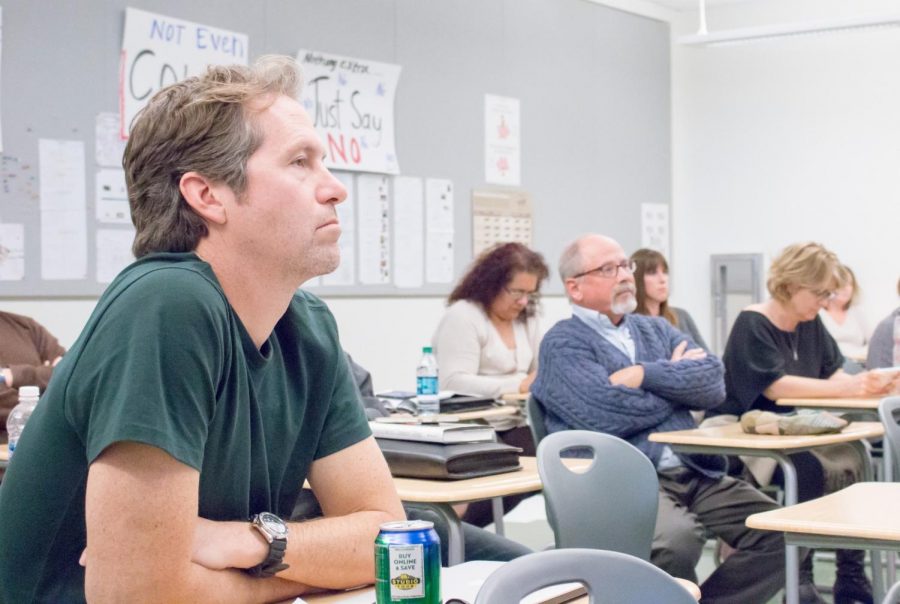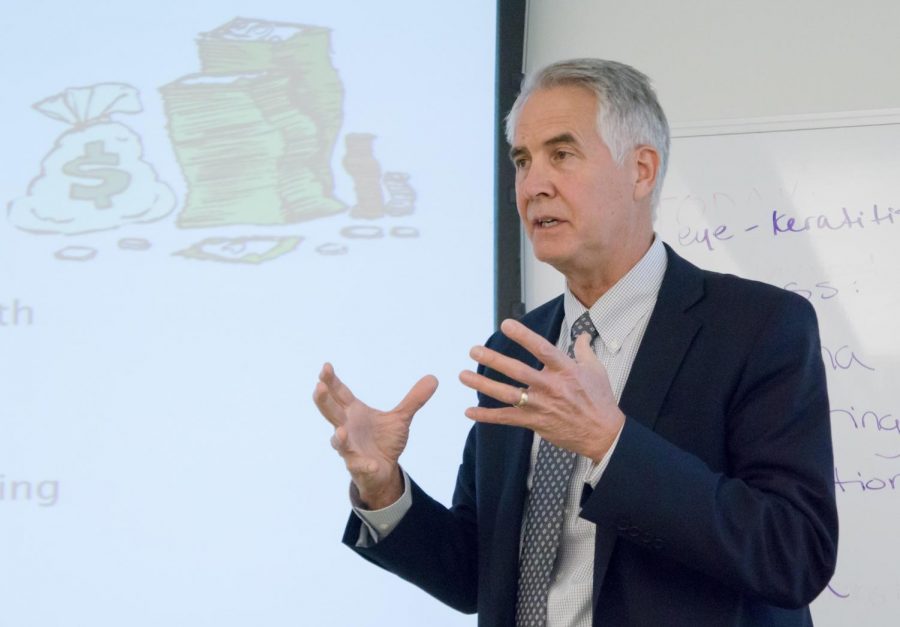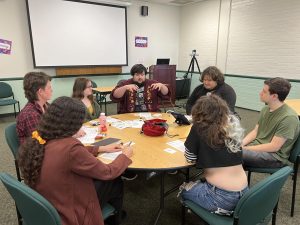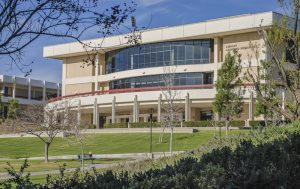Chancellor forum highlights concerns over funding for tuition-free college, union negotiations
Chancellor Greg Gillespie expresses concern about the impact of state legislative initiatives such as Assembly Bill 19, on the district budget. AB19 offers tuition-free community college for first-year students, but is has not been funded yet. Photo credit: Cole Carlson
December 7, 2017
The chancellor expressed concerns over funding for legislation that would offer tuition free community college for first-year students, during a campus forum on Dec. 4.
Chancellor Greg Gillespie is concerned that Assembly Bill 19, the Community College Promise bill, will be funded out of an already established general fund and not from a new source.
“We are excited about that because ultimately that can lead to free community college for everyone,” said Gillespie. “Community college really opens the door of opportunity for most of our population to higher education, leading to jobs, leading to transfer. The one thing that’s missing is the funding of how it’s going to be paid for.”
Gillespie hosted the forum as part of an initiative to connect with campuses. The forum tackled legislative and budget challenges the district is facing. More than 30 people attended the event that included district representatives, campus administration, and faculty. With flat enrollment across the district and the now 18-month-long labor negotiations with faculty, the forum offered an opportunity for Gillespie to justify his office’s approach to the upcoming budget.
“That’s one of things we are having these forums for, to really help others understand what are our budget realities,” said Gillespie. “We are not alone with community colleges in having a situation where our expenses are increasing more rapidly than our revenue and that’s not sustainable long term.”
Gillespie highlighted that 46 bills affecting community colleges were signed into law in the last two state legislative sessions. Many of these initiatives provide categorical funding for specific programs rather than increasing the general budget. The district is working with legislators to make sure AB19 is funded with new money, and not from funds already established in Proposition 98, which funds K-12 and community college education.
“They are talking about taking those dollars from Prop 98 to pay for the promise which ultimately just redistributes the funds that we already have which would then make our regular budget a little more challenged,” said Gillespie. “We are trying to work with legislatures to have the AB19 be funded with new money, and then really have it be a program that is opening the doors for everyone to community colleges.”
Initiatives such as the College Promise Bill and other legislation were cautiously supported by Gillespie. He warned that new bills could lead to the loss of local control to the hands of the state government and special interests.
“It’s good that the legislation has some focused efforts on how we can serve students and certain populations of our community better, but that also takes time and resources for us to do that,” said Gillespie.
Philosophy professor Jerry Caplan blamed the stream of initiatives over recent years for what he perceived as an erosion of his effectiveness as a teacher.
“They [legislative initiatives] seem to increase the need for more administrative attention, more money from administrators and more participation from faculty and things which are well intentioned but draw us away from the initial duty which is to be in the classroom and interface with students,” said Caplan. “The single most effective thing we could do is limit the number of students in the classroom so I can spend more time individually.”

The district experienced just 0.3 percent growth for this year to date, according to Gillespie’s presentation. The amount of funding the district receives is mostly dependent on enrollment numbers. This flat growth means the district is not receiving substantial additional funds in the near future. Gillespie expressed concern for rising fixed costs relating to pensions and medical benefits impacting the upcoming budget.
The district has been in labor negotiations with the Ventura County Federation of College Teachers for the past 18 months. The district has so far refused to increase faculty salaries in accordance with a rise in the cost of living in the area. According to Gillespie’s presentation, faculty salaries in the district are below the 50th percentile.
Gillespie, who came into office just 5 months ago, stated that he hopes to resolve the negotiations quickly. He was met with criticism from faculty in attendance. Counselor Anitra Evans called out Gillespie for accepting a pay raise with his hiring as the chancellor. With over $30 million in district reserves, faculty members such as Evans called for a raise in salaries.
“So you’re taking from the laborers and rewarding the management,” said Evans. “The whole trickle down thing. That does not work. You have unfortunately bred really poor will with faculty. Its unfortunate. I’m afraid that people are not going to participate.”
Anthropology professor Andrew Kinkellas echoed Evans criticism of the district and explained what he perceived as a demoralization of the faculty at Moorpark College.
“I think it’s the choices of you and the board which are really holding us back,” said Kinkellas. “I think the choice of not giving us a 1.56% COLA (cost of living adjustment) was an awful political choice on your part. I think you are going to get terrible repercussion from that… I have never had that feeling here of demoralization by how divorced you and the board are from how things are today.”
Gillespie held to his position that the district should use money in the reserve judiciously and only on one time expenses. He stated that the district should prioritize meeting recurring fixed costs with recurring revenue.
“Its very easy to just say that there is plenty of money and admin is not giving us a raise because they don’t value or respect us,” said Gillespie. “The issue is much more complicated than that as you can see from the budget and numbers that are here. Our negotiation teams have been really working to come to an agreement… If we move into mediation that’s okay, because that’s just another way to continue negotiations. We need to settle.”









